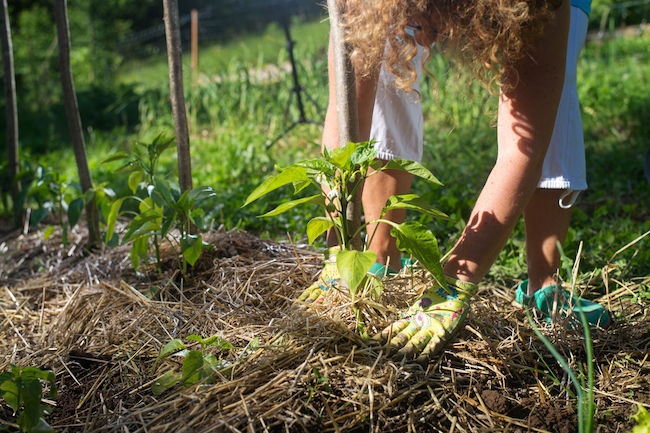
Permaculture is more than just a style of gardening. Created 30 years ago by Bill Mollison and David Holmgrem, it’s a system for fostering a more sustainable lifestyle overall. The framework of permaculture can be used anywhere and by anyone, to the benefit of both individuals and the environment.
Some of the most fundamental parts of permaculture comprise the 12 permaculture design principles. According to Permaculture magazine, these include:
- Observe and interact
- Catch and store energy
- Obtain a yield
- Apply self-regulation and accept feedback
- Use and value renewable resources and services
- Produce no waste
- Design from patterns to details
- Integrate rather than segregate
- Use small and slow solutions
- Use and value diversity
- Use edges and value the marginal
- Creatively use and respond to change
In addition, there are also three permaculture ethics: Earth care, people care, and fair share.
Incorporating some of these principles and ethics into your daily life is a simple way to live more sustainably. No matter who you are or where you live, you can apply a few of these projects to integrate and work with permaculture in a tangible way.
Add bird, bat, or insect houses to your property.
Birds, bats, and beneficial insects help pollinate crops and reduce pests. Get to know your local species and encourage them to visit your property by providing proper habitats. Using nature’s helpers to deal with pests is a great alternative to chemical insecticides.
Install solar panels.
It may not be possible for everyone, but if you’re looking to reduce your carbon footprint, switching to solar can have a big impact. Check for tax credits, as well as solar-focused nonprofits in your area that can help make the transition more financially feasible.
Grow your own herbal tea.
Not everyone has room for a huge garden, but even if you only have a window box, you can grow some herbs to create your own herbal teas. Visit our post, Simple Sip: Grow Your Own Herbal Tea Garden for ideas.
Buy local, seasonal food.
Purchasing local food helps support small farmers and reduces the environmental cost of your food. When you purchase food that’s produced in your area, less fossil fuels are used to refrigerate and transport goods than if they are imported from far away.
Set up a rain barrel.
Rain barrels can be as simple as a clean trash can set up under a gutter downspout to water the garden or as involved as large cisterns that provide water for an entire household. Whatever type of project you’re able to tackle can help you conserve water and reduce stormwater runoff. Rain catchment systems also make us more aware of the amount of water we use.
Start composting.
Setting up a compost bin in your backyard, or even a tiny vermicompost system in your apartment closet, is an excellent way to reduce your waste. It keeps organic material out of the landfill and allows you to reuse nutrients in your garden.
Avoid plastic.
In the modern world, it can be tough to move away from plastic. Finding renewable alternatives can be tough, but making a few small changes can add up. Simple swaps, including purchasing foods like peanut butter in glass jars and bringing your own water bottle to work, can decrease the amount of plastic that gets thrown away each year. Check out our post, 10 Ways to Ditch Plastic in Food and Farming, for more great ideas.
Plant perennials.
Adding perennials to your landscape may not have the immediate reward that annual crops do, but if you’re willing to wait, perennials like blackberry bushes and walnut trees can produce a bounty of food. They also help provide wildlife habitat and reduce erosion.
Bake your own bread.
Making your own bread or other foods from scratch allows you to slow down and connect. Being able to create nourishing food from simple ingredients is a valuable life skill. It also allows you to avoid excess packaging and unnecessary ingredients.
Grow heirloom varieties and heritage breeds.
By purchasing and maintaining heirloom plant varieties and heritage livestock you’re helping to preserve genetic diversity and history. Unlike modern varieties, heirlooms have been passed down over generations and are deeply connected to the people that grow them. They play an essential role in different cultures’ customs and diet.
Teach your children to garden.
When you garden with your kids you help instill a reverence for nature and pass on an important life skill. While you pick beans and pull weeds, your kids will learn how food is produced and the value of hard work, along with the diligence it takes to put food on the table.
Keep bees.
Beekeeping isn’t as scary as it may sound. Adding a couple of beehives to your backyard (or even a rooftop) can help ensure the survival of honeybees. Honeybees and other pollinators play a critical role in agriculture. About 35% of the world’s food crops rely on pollinators to reproduce. Plus, you get delicious honey!
Just like the small farms The FruitGuys Community Fund strives to support, your small actions can have big impacts. Looking at your life while considering the principles and ethics of permaculture can help you make meaningful changes. Take a leap toward a more sustainable lifestyle by trying a few of these simple projects.




